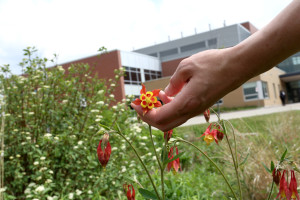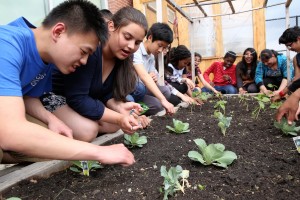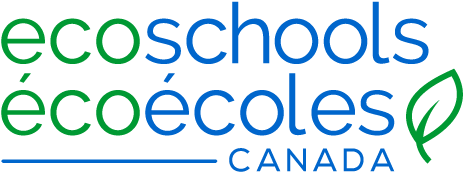Written by LASS teachers Linda Ryan and Carmelina Figliomeni-Crupi, with input from the EcoSquad
Louise Arbour Secondary School (PDSB) has been a certified EcoSchool since the school opened in the fall of 2010. The vibrant hands-on, Ecoschools program supports the school mission of helping students to develop into socially responsible citizens through authentic learning. The program is coordinated by an EcoSchools Committee which includes teachers, administrators, custodial staff, students and a parent council member. Environmental initiatives are spearheaded by the EcoSquad club which is made up of a seven-member elected executive and thirteen general members for a total membership of twenty students.
This year, club members took part in leadership training opportunities including hosting the Peel Environmental Youth Alliance Conference (EcoBuzz), participating in a hands-on micro-plastics water pollution workshop, and travelling to York University for the Change Your World Leadership Conference.
One foundation of the EcoSchools Program is effective waste minimization and LASS staff and students have implemented a comprehensive recycling program throughout the school. A hallway and cafeteria recycling bin program is maintained by EcoSquad students as part of their weekly action team.
The club also holds regular “Rewards Recycling” events at lunch to remind students to recycle properly. Organic waste from the Hospitality program is diverted from landfill through a vermicomposting system. EcoSquad students also addressed the growing issue of EWaste this year by running a Home Form Battery Collection Challenge and by hosting a weekend community EWaste Drive to encourage responsible recycling of old and broken electronics.
EcoSquad students help to keep energy conservation in the limelight by holding a LASS Earth Hour event each year to remind the school community of how individual actions can collectively have a significant impact. Hall lighting is dimmed and the school community is encouraged to reduce use of electrical devices. Spring and fall energy audits have highlighted the fact that computers are sometimes left on in shared computer labs. To address this problem, club students have started weekly “spot checks” of common-use areas. Audit results are shared through the video wall and through regular EcoSquad updates in the school newspaper.

Greening initiatives are a favourite with LASS students and the LASS Native Species Peace Garden, was designed and installed by EcoSquad students in the spring of 2012. Club volunteers faithfully watered, weeded and mulched tender young plants during hot summer months and the Native Species Peace Garden has now developed into a mature, natural space with native shrubs, flowering plants and grasses that improve schoolyard biodiversity.
Building on the success of the native species garden, the LASS Local Food Initiative began with the installation of a student-built greenhouse and has grown to include a courtyard herb and greens garden, a raised-bed vegetable garden and a vegetable seedling propagation program.
The local food initiative has involved students from various departments and grades. Construction Technology students, led by Technology teacher Joe Tavares, built the greenhouse in preparation for the SKILLS Ontario competition. Grade 9 Technology students, led by Technology teacher Tom Morley, manage the raised vegetable beds as part of the Green Industries curriculum. EcoSquad students started heritage vegetable seedlings and shared these seedlings with the school and local community through a seedling sale. At harvest time, produce from the garden will be used by hospitality students to create delicious dishes in the student-run Café 123 and extra vegetables will be donated to local community food agencies.
The latest greening initiative is the installation of an outdoor classroom in a grassed area a djacent to the school track. Students in the Technology Design class developed a number of original designs for this space. With the support of the Toyota Evergreen Learning Grounds School Ground Greening Grants and other funders, the student-designed classroom will be in place in the fall of 2016. This space will be used by neighbouring schools and community members in addition to being used frequently by the LASS staff and students as they take learning outside!
djacent to the school track. Students in the Technology Design class developed a number of original designs for this space. With the support of the Toyota Evergreen Learning Grounds School Ground Greening Grants and other funders, the student-designed classroom will be in place in the fall of 2016. This space will be used by neighbouring schools and community members in addition to being used frequently by the LASS staff and students as they take learning outside!
Other environmental stewardship campaigns have included innovative repurposing of “unwanted” materials through the Upcycled Holiday Craft ornament sale in December and Recycled Paper Book Marks to celebrate Earth Week 2016. Water initiatives were also at the forefront this year and included a school-wide “Make your Watermark” Water Bottle Logo Design Contest. Staff and students enthusiastically voted for their favourite water bottle logo and the brand new LASS water bottles now sport the winning student design. Staff and students can conveniently fill their reusable water bottles at the Water Refill station installed last spring through the generous support of Principal Sharron Kuhl.
Environmental learning is infused throughout the curriculum as LASS teachers include environmental learning in all curricular areas. Before reading “Hunger Games”, English students spent time participating in outdoor survival games which helped them to visualize and express the ideas and themes of the adventure novel. Environmental Science students took on a personal eco-action project and shared their progress through daily tweets. Chemistry students created infographics on current water-related environmental issues to extend their study of solutions.
Looking to the future, LASS EcoSquad students hope to share their passion for the environment by working on shared environmental initiatives with younger students at nearby elementary schools. By mentoring future LASS students, EcoSquad members hope to inspire a new generation of “eco-warriors” to continue the rich legacy of environmental stewardship.

Recent Comments